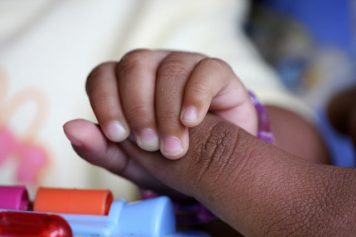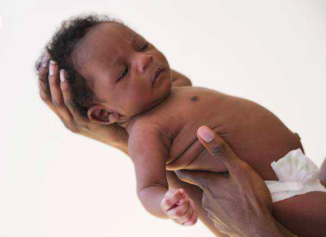
The mortality rate for Black infants is more than two times higher than it is for white babies. (Photo by Michelle Gibson/Getty Images)
In an effort to address high infant mortality rates among Black newborns, the city of Baltimore has begun training doulas, or “women who help,” to assist mothers during pregnancy, delivery, post-delivery and beyond.
The new initiative is the latest push in the Baltimore City Health Department’s 7-year-old program aimed at reducing stark racial disparities in infant mortality, according to The Pew Charitable Trusts’ “Stateline.” Reports show that the U.S. infant mortality rate for Black babies is more than twice that of white babies.
“The impetus for this program is the huge disparity in infant mortality between Blacks and whites born in this city,” said Stacey Tuck, maternal and child health director at the department.
Baltimore isn’t the only city working to tackle this issue, however. New York, Chicago and Tampa have also launched doula-training programs to help improve newborn health, Stateline reported. Other cities like Denver and San Francisco are looking to start their own programs, as well.
The Baltimore new initiative is part of a program has already made some notable gains. When the city started B’more for Healthy Babies, in 2009, white babies were three times more likely to survive infancy than Black babies. That gap narrowed to two-and-a-half times more likely by 2014, according to the news site.
While doulas aren’t trained medical providers like midwives, they are trained to help expectant mothers through delivery and beyond. A study published in The Journal of Perinatal Education in 2013 showed that doula-assisted mothers are less likely to deliver babies with low birth weights or with birth complications. Mothers assisted by female caregivers are also less likely to have C-section births, require painkillers or deliver newborns in poor health, another study found.
African-American mothers in particular have had a long history with doulas, most notably during the Jim Crow Era when Black women were denied access to hospitals, according to Andrea Williams-Salaam, a doula trainer in the Baltimore program. Many Black women were forced to deliver their children at home until racial barriers fell and hospitals became the recommended and “safest” option for childbirth. As a result, fewer women practiced as doulas.
The help that assistants provide today go way beyond the delivery room. For instance, Baltimore is training its doulas to work as independent contractors to help with pregnancies and connect low-income women to housing, transportation, health and employment services, according to Stateline.
“The doulas are there to assist, support and empower a woman in whatever way she needs assistance,” Williams-Salaam said. “That could be accompanying the woman to medical visits to help with the terminology used by the caregiver, or helping her obtain proper nutrition, housing or employment.”
Because of most clients’ inability to pay, the Baltimore program will not compensate its doulas for their work, according to Tuck. The cost of a doula can range anywhere from $100 to $5,000. Right now, it’s costing the city about $5,000 to train its first group of female assistants.
“This is primarily about service and giving back to the community,” Tuck told the publication. “The five women who have enrolled as trainees, their motivation is not compensation, that’s for sure.”


